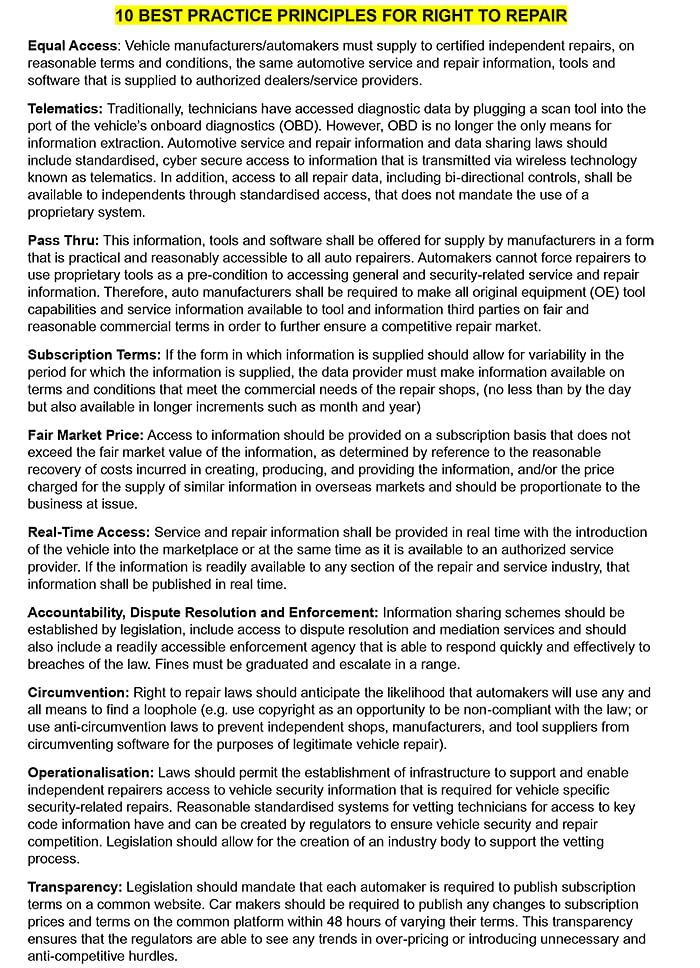ACMA joins global ‘Right to Repair’ movement for vehicles, aftermarket to get a boost
The legislation will unleash the aftermarket in India and help it evolve into an organised sector. Globally, the size of the aftermarket is as large as the OEM supply; in India, it is just 18% of the overall $56.5 billion auto components market.
ACMA (Automotive Components Manufacturers Association of India) has joined other global association leaders to support the critical global ‘Right to Repair’ movement by signing the new right to repair position statement with its 10 best-practice principles (detailed below). These are designed to unschackle the aftermarket.
The statement enumerates the core beliefs of the movement and the objectives and intended outcomes of right to repair legislation. Importantly, the document sets forth 10 best practice principles for developing a framework for right to repair legislation that any supporting country can use and adapt to their needs.
Globally, the automotive aftermarket keeps 1.5 billion vehicles on the road while contributing $1.8 trillion to the global economy. After vehicles exit their warranty period, independent repair shops perform 70% of repairs. This vibrant industry and the consumer choice that it creates is being threatened by automotive manufacturers that block access to wirelessly transmitted vehicle repair and maintenance data.
Enabling access to affordable vehicle service and repair
Without the convenience and choice of independent parts and repair, especially in suburban and rural communities, consumers will have limited access to affordable vehicle service and repair. These restrictions can have catastrophic effects on local economies and the well-being and safety of millions that rely on vehicle transportation daily.
Globally, consumers are facing a significant threat to their right to repair their vehicles at auto repair shops of their choice. Furthermore, vehicles are increasingly becoming like cellphones, or computers or wheels, connected wirelessly at all times. These connected vehicles collect thousands of data points on the health of vehicle systems. The automakers then transmit these data to themselves wirelessly, obstructing access to it by independent repair shops. Without access to this data, there are significant risks to the automotive aftermarket including:
Independent auto repair shops cannot service a vehicle, and it becomes more difficult to ensure vehicles are operating as efficiently and safely as possible;
- Consumers will lose the right to repair their vehicle at the auto repair shop of their choice, and the problem is expected to continue to grow;|
- Reduction in competition for service and repair of vehicles, thus risking shop closures, compromising hundreds of thousands of jobs, and limiting access for consumers to an affordable repair market; and
- Governments may not meet their EV adoption goals because there will not be enough service and repair options for such vehicles.
- For a truly open, fair, and competitive automotive aftermarket, consumers need to be protected by legislation that reflects the new reality of vehicles, which is what the Right to Repair Movement represents.
Aftermarket just 18% of overall components market in India
The Aftermarket in India contributes US$ 10.1 billion (Rs 83,294 crore) to the economy and is one of the fastest growing segments of the auto components Industry.
Commenting on ACMA becoming part of the Right to Repair Movement, Vinnie Mehta, director general, ACMA said, “ACMA has joined this global movement to express solidarity with other international like-minded associations across automotive nations for unshackling the aftermarket. Further, it is very heartening that the Ministry of Consumer Affair, Food & Public Distribution, Government of India has already taken the initiative of creating a framework for Right to Repair. The products to be covered under this regulation will include automotive products as well. It is also pertinent to note that a significant proportion of the automotive aftermarket in India is serviced by unorganised players. A legislation such as Right to Repair will unleash the aftermarket in India and help it evolve into an organised sector. Globally the size of the aftermarket is as large as the OEM supply, however in India it is just 18% of the overall $ 56.5 billion auto components market.”
Both Australia and South Africa have successfully retained their drivers’ right to repair their vehicles. These countries are a model for similar legislation in other countries that levels the playing field and keeps the consumer at the heart of decision-making across the transportation ecosystem.

RELATED ARTICLES
Cosmo First diversifies into paint protection film and ceramic coatings
The Aurangabad, Maharashtra-based packaging materials supplier is leveraging its competencies in plastic films and speci...
JSW MG Motor India confident of selling 1,000 M9 electric MPVs in first year
The 5.2-metre-long, seven-seater luxury electric MPV, which will be locally assembled at the Halol plant in Gujarat, wil...
Modern Automotives targets 25% CAGR in forged components by FY2031, diversifies into e-3Ws
The Tier-1 component supplier of forged components such as connecting rods, crankshafts, tie-rods, and fork bridges to l...






 By Autocar Professional Bureau
By Autocar Professional Bureau
 10 Mar 2023
10 Mar 2023
 8165 Views
8165 Views









